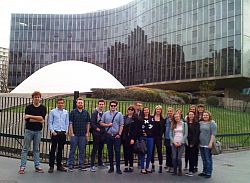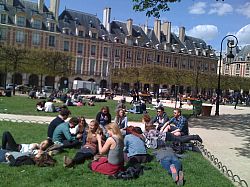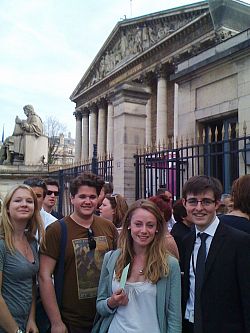Politics students observe the parliamentary process in Paris
As part of their visit to the National Assembly in Paris last week, 16 Sussex students following second- and third-year courses on French politics attended the most controversial debate so far of the Hollande presidency, on the bill to approve same-sex marriage.
 A highlight of the four-day politics trip to Paris in April 2013 was a visit to the striking HQ of the French Communist Party, designed by the famous Brazilian architect Oscar Niemeyer.
A highlight of the four-day politics trip to Paris in April 2013 was a visit to the striking HQ of the French Communist Party, designed by the famous Brazilian architect Oscar Niemeyer.
 Sussex politics students enjoying the weather in the Place des Vosges during a visit to Paris in April 2013.
Sussex politics students enjoying the weather in the Place des Vosges during a visit to Paris in April 2013.
 Sussex politics students outside the National Assembly in Paris, waiting to see a parliamentary debate on a bill to propose same-sex marriage.
Sussex politics students outside the National Assembly in Paris, waiting to see a parliamentary debate on a bill to propose same-sex marriage.
After many hours of debate in the parliamentary process, the bill had returned to the Assembly for the final reading and this was accompanied by massive street protests aiming to persuade the government that the legal majority should take account of ‘popular legitimacy’ and withdraw the bill.
This inevitably meant a heightened police presence on the streets of Paris, especially in evidence around the Assembly and Senate on the group’s visits to both places.
Trip leader Dr Sue Collard, Senior Lecturer in French Politics, says: “We were able to avoid these visible tensions on our visits to quieter places such as the beautifully harmonious Place des Vosges, home to some of France’s wealthiest politicians – including the now disgraced Dominique Strauss-Kahn and former Culture Minister Jack Lang.”
Another highlight of the four-day trip was a visit to the striking headquarters of the French Communist Party, designed by the famous Brazilian architect Oscar Niemeyer who, as a communist, did not charge a fee for his design. The building, which is testimony to the former power of the party in French politics, is now listed.
Two floors are currently rented out as the party is a much diminished force, not as a result of the collapse of communism elsewhere in Europe, but as a result of François Mitterrand’s strategy when he took over the leadership of the new Socialist Party in 1971, to reverse the balance of power between the two rival forces of the Left.
Dr Collard says: “Our speaker, a member of the National Executive Council of the party in charge of European affairs, admitted that the party had made ‘a mistake’ in its dealings with Mitterrand, but that it was nevertheless the only communist party to have survived the upheavals of 1989, and is now able to offer an alternative to the social-democratic ‘austerity’ policies of the current Socialist presidency.”
Other visits included:
- the Paris City Hall, which will be the site of a major mayoral election next year, when the Left is likely to lose its overwhelming majority and the winner is likely to be a woman, whichever party wins;
- the Shoah memorial museum, explaining France’s role in the deportation of Jews under the Vichy government, contextualised within a long history of anti-semitism;
- the Pompidou Centre at Beaubourg, first of the major cultural projects in Paris initiated by French presidents;
- and one of Mitterrand’s architectural projects, the Great Arch at La Défense (the capital’s high-rise business district), where it is possible (on a clear day) to look down the ‘triumphal axis’ through the Arc de Triomphe to Pei’s glass pyramid at the Louvre.
